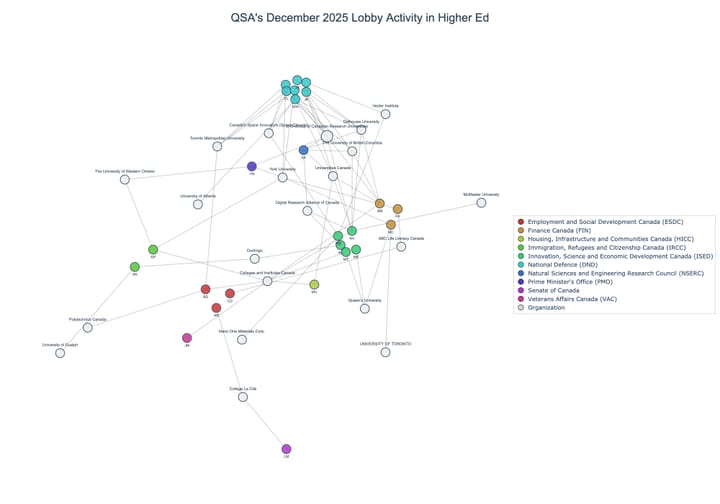QSA's Week in Higher Ed (#46, 2025)
Budget 2025 allocates $1.5B to youth employment initiatives; StatsCan reports 5.8% enrollment surge at postsecondary institutions; $2.2M for space health research at CSA; Canada launches new defence innovation hub in Halifax; U.S. extends comment periods for higher ed accreditation and loan progr...

Good morning! This is Queen Street Analytics' weekly roundup of regulatory developments, legislative discussions, political announcements and other government-related news concerning colleges, universities, campuses, research initiatives and funding, and the tri-council (CIHR, NSERC, SSHRC) agencies. Every Monday, we break down the most important updates in this space in under five minutes.
Want to see GR activities in areas of the economy related to the Higher Ed channel? Don’t miss this week’s updates in Social Issues and BioPharma.
Dates: 2025-11-16 to 2025-11-22
📋 In This Week's Newsletter
• 🏛️ This Week's Parliamentary Calendar
• 🇨🇦 Canadian Federal Government News
• 🗺️ Canadian Provincial Government News
• 🇺🇸 US Federal Government News
• 📚 What We're Reading This Week
This Week's Parliamentary Calendar
- Standing Committee on Citizenship and Immigration: Canada's Immigration System: The committee will hold a meeting on November 25 from 3:30 to 5:30 p.m., featuring witnesses from Accueil francophone du Manitoba, Éducation internationale, and Centre de services scolaire du Lac-Saint-Jean to discuss the Canadian immigration system and international student program.
- Standing Committee on Science and Research: Artificial Intelligence: A meeting is scheduled for November 24, 11:00 a.m. to 1:00 p.m., with panelists from CGI Inc., Struxture Data Centers Inc., McGill University, Computer Research Institute of Montréal, and Mila discussing developments and policy considerations in AI.
- Standing Committee on Human Resources, Skills and Social Development: Government Mandates and Key Priorities: On November 25 from 11:00 a.m. to 1:00 p.m., Minister Patty Hajdu and departmental officials will address committee questions on program delivery, including skills and employment initiatives relevant to the higher education sector.
- Standing Committee on Health: Impact of Immigration Policy on Healthcare: The committee will meet November 27 from 11:00 a.m. to 1:00 p.m. to review how immigration policy affects healthcare, with Dr. Patricia Houston of the University of Toronto's Temerty Faculty of Medicine among the witnesses.
- Senate Committee on Social Affairs, Science and Technology: Bill S-212 Clause-by-Clause: Clause-by-clause consideration of Bill S-212 (National Strategy for Children and Youth in Canada) is scheduled for November 27 at 10:30 a.m., Senate of Canada Building.
Canadian Federal Government News
Budget 2025 Launches Major Youth Employment Funding Initiatives
Minister Patty Hajdu announced the details of Budget 2025 youth employment investments during Education Savings Week. The federal government is committing more than $1.5 billion to fund youth skills and career support. $635.2 million over three years, beginning in 2026–27, will expand the Student Work Placement Program, targeting about 55,000 work-integrated learning opportunities for post-secondary students in the 2026–27 academic year. In addition, $594.7 million over two years is allocated to the Canada Summer Jobs program to support around 100,000 positions, and $307.9 million over two years will be deployed through the Youth Employment and Skills Strategy to serve approximately 20,000 youth facing employment barriers annually. The government plans to invest $40 million over two years for the creation of a Youth Climate Corps, integrating paid skills training tied to climate emergency response and adaptation work. These plans affect a range of employers, educational institutions, and students, setting up a series of new pathways for youth to engage in career-ready experiences.
Sources: www.canada.ca

Canadian Postsecondary Enrollments Climb 5.8% in 2023/24
Statistics Canada data indicates that public college and university enrolments reached 2.3 million students in the 2023/24 academic year, representing a 5.8% increase from 2022/23. This marks the first significant rise since the onset of COVID-19, following a slight decline in 2020/21 and modest growth in subsequent years. The data shows robust student demand across the postsecondary sector, with implications for institutional planning, resource allocation, and service delivery.
Sources: www.statcan.gc.ca
Canada Backs French-Language Research with $900,000 Grant to Acfas
Canadian Heritage, via Parliamentary Secretary David Myles, announced $900,000 in funding over three years to support Acfas’ Service d’aide à la recherche en français. The service supports Francophone minority researchers—professors, postdoctoral fellows, and graduate students—providing assistance for funding applications, ethical certification, and events that mobilize the Francophone scientific community. The funding is part of the Action Plan for Official Languages 2023–2028, advancing researcher capacity within French-language postsecondary institutions and encouraging pan-Canadian collaboration through annual events.
Sources: www.canada.ca
CSA Grants $2.2 Million to Biomedical Space Research
The Canadian Space Agency announced over $2.2 million for 16 human health research projects led by 12 Canadian institutions. These studies examine the effects of spaceflight conditions on human health, focusing on microgravity-induced medical phenomena analogous to chronic diseases on Earth, such as anemia and bone loss. Projects will analyze spaceflight experiment data and run ground-based simulations, with findings expected to inform both future space missions and improve chronic disease research and treatment on Earth.
Sources: www.canada.ca
First Maritime Defence Innovation Secure Hub Announced at Halifax COVE
Defence Minister David J. McGuinty introduced Canada’s inaugural Maritime Defence Innovation Secure Hub (DISH) at COVE in Halifax with an investment of $29.4 million. This new hub, the first in a planned national network, provides a secure, collaborative space where researchers in industry and academic sectors can develop and test advanced technologies that require classified handling. The Halifax hub will focus on ocean-related technologies, including undersea domain awareness, uncrewed systems, advanced maritime sensing, and AI analytics. The initiative is intended to enhance dual-use technology development through federal-academic-industry partnerships.
Sources: www.canada.ca
Universities Canada Calls for Increased Support for Student Housing in Federal Finance Update
During a Senate committee hearing on the 2025 economic update, Gabriel Miller, CEO of Universities Canada, pressed for stronger federal measures addressing student housing shortages. Miller identified gaps in current support mechanisms and urged for inclusive housing strategies to assist growing student populations. The session also referenced innovative approaches like industrialized construction to increase affordable student housing stock, with other stakeholders discussing integration of these models into government procurement and budgeting frameworks.
Sources: senparlvu.parl.gc.ca
Senate Committee Examines Internal Trade and Labour Mobility Act Regulations
Federal regulations stemming from the newly enacted Free Trade and Labour Mobility in Canada Act are scheduled to come into effect January 1, 2026, as confirmed by Minister Dominic LeBlanc. The new framework allows goods, services, and certified workers that meet a province or territory’s requirements to be accepted under comparable federal standards. Sectors including education and labour mobility are impacted, particularly regarding regulatory harmonization and mutual recognition of worker certifications across jurisdictions. A user guide is expected in December to clarify operational changes for industry and institutions.
Sources: www.canada.ca
Federal Support for Bilingual Workforce and Francophone Entrepreneurship in Ontario
FedDev Ontario announced over $1 million for three Francophone-led organizations focused on bilingual workforce and entrepreneurship in southern Ontario. Recipients include ACFOMI for up to 12 tourism and service businesses, Fédération des gens d’affaires francophones de l’Ontario for expansion of French-language support to 200 businesses, and Collège Boréal for employment pathways for Francophone newcomers. The two-year program intends to help participating organizations address skills shortages, enhance business resilience, and foster bilingual workplaces.
Sources: www.canada.ca
Senate Committee Debates Pan-Canadian Strategy for Children and Youth
A Senate Social Affairs, Science and Technology Committee review of Bill S-212 drew testimony from the Manitoba Métis Federation and First Nations of Quebec and Labrador Health and Social Services Commission, pointing to gaps in distinction-based approaches for Indigenous youth. Witnesses called for amendments ensuring rights and self-determination and advocated for a standing Indigenous advisory committee. Input from youth representatives and advocacy groups advocated for greater inclusivity, tailored supports, and youth participation in strategy development.
Sources: senparlvu.parl.gc.ca
Senate Committee Considers Impact of AI and Data Issues on Minority-Language Arts Sector
At the Standing Senate Committee on Official Languages, the Fédération culturelle canadienne-française reported challenges in securing diversified funding and navigating the effects of artificial intelligence on the French-language arts sector. The organization called for improved data collection, digital literacy, and pan-Canadian cultural diplomacy strategies. The session also discussed integrating arts and culture into the modernized Official Languages Act.
Sources: senparlvu.parl.gc.ca
Ocean Carbon Management Strategies Discussed at Senate Committee
The Senate Fisheries and Oceans Committee discussed ocean carbon sequestration, with Natural Resources Canada outlining current investments in carbon management and the nascent state of marine CDR (carbon dioxide removal) technologies. Relevant regulatory frameworks and research collaborations remain under development, with oversight required to ensure compliance with fisheries habitat laws and emerging technology standards.
Sources: senparlvu.parl.gc.ca
Canadian Provincial Government News
Saskatchewan Marks International Education Week, Highlights International Student Contributions
Saskatchewan celebrated International Education Week, noting nearly 14,000 international students in the province during 2024–25 and over 1,600 international research publications from its postsecondary institutions.
Sources: www.saskatchewan.ca
Nova Scotia Launches Local Food Procurement Program at Universities
Nova Scotia's new Institutional Development Expansion and Advancement (IDEA) program funds increased local food sourcing in universities, hospitals, and public institutions, engaging agricultural producers and food service distributors.
Sources: news.novascotia.ca
British Columbia Opens Indigenous Law Wing at UVic
The University of Victoria commenced use of its new Indigenous law wing, which will support teaching and research in Indigenous legal traditions, following $46 million in joint federal, provincial, and institutional funding.
Sources: news.gov.bc.ca
Alberta Publishes Report on Classroom Complexity and Workforce Funding
Alberta released a report from its Aggression and Complexity in Schools Action Team, leading to the allocation of $300 million over three years for 1,500 new educational assistants and additional student services.
Sources: www.alberta.ca
New Brunswick Advances Psychiatry Resource Strategy with Postsecondary Collaboration
New Brunswick's Department of Health announced implementation steps for its Psychiatry Resource Strategy, involving partnership with Dalhousie University and Université de Moncton to address recruitment, retention, and workforce training.
Sources: www2.gnb.ca
US Federal Government News
White House Cites Decline in International Student Enrollments
The White House issued a statement reporting a 17% decrease in new foreign student enrollment at U.S. colleges, linking it to recent changes in immigration policy. Other cited developments include reduced immigrant student enrollment in public schools and broader economic indicators tied to tax and trade policy.
Sources: www.whitehouse.gov
U.S. Department of Education Opens Comment Period on Accreditation and Disclosures Data
The Department of Education’s Federal Student Aid announced a 30-day public comment period for extending the existing data collection on institutional and programmatic accreditation disclosures (OMB Control Number 1845-0156). The current review pertains to requirements at 34 CFR 668.26 and 668.43, affecting reporting by colleges, universities, and accrediting agencies. No regulatory changes are proposed; the process involves an estimated 17,116 annual responses.
Sources: www.federalregister.gov
Regulatory Comment Period for Federal Family Education Loan Program
Federal Student Aid announced the extension of data collection under the Federal Family Education Loan Program (OMB Control Number 1845-0020), with no regulatory changes. The collection supports annual reporting processes and affects postsecondary institutions, lenders, and government entities.
Sources: www.federalregister.gov
Survey of State Government R&D: Public Call for Feedback
The Census Bureau invited public comments on the proposal to extend the Survey of State Government Research and Development, which captures R&D expenditures by U.S. state agencies. The survey data informs multiple federal research and policy authorities, with an annual burden estimate of 1,456 hours.
Sources: www.federalregister.gov
Notice: Accrediting Agencies Under Secretary Review
The U.S. Department of Education issued a Federal Register notice seeking third-party comments on accrediting agencies undergoing recognition review for the 2027 NACIQI meeting. Agencies include those in medical, language, and arts education. Comments must address compliance with recognition standards and are accepted via email by deadlines specified in the notice.
Sources: www.federalregister.gov
What We're Reading This Week
- When it comes to post-secondary education, whose line item is it anyway?: Letter highlights funding disputes across different levels of government in postsecondary education.
- Canada’s international student cap helped lower rents. But will it bring colleges and universities down as well?: Analysis examines effects of the federal international student cap on housing and postsecondary finances.
- Patrick Corrigan: Universities reduced to begging: Editorial cartoon comments on universities' evolving financial constraints.
- Corrective to Nov. 17 story on skills development funding in Ontario: Correction issued regarding coverage of skills development programs.
- Federal budget creates a massive educational opportunity for Doug Ford: Contributor explores implications of the federal budget for Ontario's postsecondary policies.
- Budget 2025 slashes Canada Student Grants, experts warn: Report details warnings from experts following reduced funding for Canada Student Grants.
- Canada is losing international students to other countries. Here's where they're going instead — and why: Overview of new trends in international student mobility and their destinations.
- Who had it better: This generation of students or the last?: Video segment compares student experiences across generations.
- The Observatoire des réalités familiales du Québec marks its tenth anniversary: Quebec research entity celebrates ten years of accessible science communications.
- More Local Food in Public Institutions Announcement: Coverage of Nova Scotia’s new program supporting local food procurement in universities.


